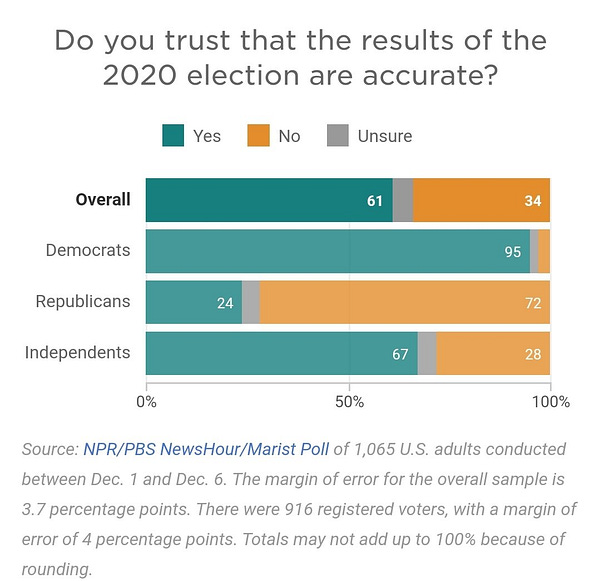It Didn’t Work. It’s Still Bad
Dismissals of Republicans’ futile efforts to subvert the election miss a key point: such efforts still erode Biden’s legitimacy, and confidence in democracy
Good evening. Voting in the 2020 presidential election ended 36 days ago. The inauguration happens in 42 days.
The Latest

“What’s the big deal?” the question goes.
Sure, Republicans have filed lawsuit after frivolous lawsuit to overturn the election results. Sure, the president makes baseless charges of election fraud at every opportunity. And sure, Republican politicians mostly continue to pretend the presidential election had no outcome — while Trump has tweeted an implied threat to the rest.
But this is meaningless, say the skeptics of people who worried that Trump and Republicans might tamper with the election. Sure, lawmakers and the president himself talked about fighting to undo a defeat at the polls. But their efforts came to naught! Biden will still be president. Therefore — Q.E.D. — no one needed to be concerned.
Let’s talk about why this is naïve.

1) What if the vote had been close?
Yes, Biden won. He won handily, in fact; he racked up more than 81 million votes, a record total!
Even so, Biden won the electoral college on the strength of slender margins in a handful of states. Had his popular vote lead been smaller — if the polling error that inflated Democratic hopes of a romp had been greater — one or more states might have shifted into Trump’s column, making the task of Trump’s maladroit team of election lawyers much easier.
Biden, his team, and his voters put the election beyond the margin of theft. That doesn’t negate the plain statements by Republicans of an intent to steal it.
2) The attempt itself is the problem.
American democracy will live to see another day. That’s great! But the failure of Republicans’ schemes has nothing to do with whether those schemes should trouble us.
The voters who believe — or claim to believe, at least — that Trump had the presidential election stolen from him are still with us. Their opinions, while they may have no basis, will shape incentives for politicians and officials in this country for years to come.


The precedent of elected officials using their offices in attempts to tamper with an election is also still with us. As Zeynep Tufekci wrote this week, we may lack the language to describe this tampering, which some call a coup — but that tampering warranted concern even if “coup” was the wrong label.


Last, the perverse incentives sustained by Republican voters’ captivation with the delusion that Trump won the presidential election are still with us. Greg Sargent summed this up well:
What does matter is what many Republican voters want to see happen now. For instance, The Post reports, protesters have descended on the houses of the GOP state House speaker in Pennsylvania and the Democratic secretary of state in Michigan, chanting, “Stop the steal.” Some have been armed. … That Pennsylvania official has received thousands and thousands of voice mails, prompting his office to describe the pressure on him as “intense.” And the Michigan secretary of state has said her 4-year-old child felt threatened.
When Trump voters besiege election officials’ houses — or leave Republican politicians concerned enough to joke that looking reticent about supporting the effort to subvert the election “would get my house bombed” — it’s small wonder that this afternoon, Republican officeholders in 17 states signed a brief to support a legally fanciful effort by Texas to toss out several states’ votes.


3) Undermining perceptions of Biden’s legitimacy.
Adam Jentleson, the former deputy chief of staff for Senate Majority Leader Harry Reid, put this well:

It’s our good fortune that we face no pressing national crises at the moment, such as a raging pandemic that can kill 3,000 people in the United States in a single day. Otherwise, we might have to worry about Biden’s ability to unify a populace in which millions have been convinced to see him as a pretender.

“Trump won’t be successful in stealing the election outright,” media critic Margaret Sullivan wrote today at The Washington Post. “But it’s already obvious that he will succeed in undermining the legitimacy of the election and of the incoming administration.” That — we can safely conclude from the repeatedly demonstrated boundlessness of Trump’s pique — was in part the point.
In any case, it bears repeating: yes, Trump’s quasi-campaign to subvert the election has failed, even if it has yet to peter out. But even failures have consequences. The consequences of Republicans’ vote denial, as Paul Krugman labeled it this week, will stay with us for some time.
In the Conversation
Paul Krugman, at The New York Times: “Republicans Can’t Handle the Truth.”
“What some people may not have been fully prepared for is the way Trump’s party as a whole has backed his dangerous delusions. … But you really shouldn’t be surprised by this willingness to indulge malicious, democracy-endangering lies. After all, when was the last time Republicans accepted a politically inconvenient fact? It has been clear for years that the modern G.O.P. is a party that can’t handle the truth. … Most obviously, Republican refusal to accept the election results follows months of refusal to acknowledge the dangers of the coronavirus, even as Covid-19 has become the nation’s leading cause of death, and even as a startling number of people in Trump’s orbit have been infected.”
Michelle Goldberg, at The New York Times: “No One Expects Civility From Republicans.’”
“The radically different way the media treats boundary-pushing on the left and on the right is about more than hypocrisy or double standards. It is, rather, an outgrowth of the crisis of democracy that shields the Republican Party from popular rebuke. There’s no point asking if the G.O.P. can control its right. It has no reason to. … Democrats have just won the popular vote in the seventh out of the last eight presidential elections. In the aftermath, analysts have overwhelmingly focused on what Democrats, not Republicans, must do to broaden their appeal. Partly, this stems from knee-jerk assumptions about the authenticity of the so-called heartland. But it’s also just math — only one of our political parties needs to win an overwhelming national majority in order to govern.’”
Zeynep Tufekci, at The Atlantic: “‘This Must Be Your First.’”
“Maybe in other languages, from places with more experience with this particular type of power grab, we’d be better able to discuss the subtleties of this effort, to distinguish the postelection intervention from the Election Day injustices, to separate the legal but frivolous from the outright lawless, and to understand why his party’s reaction—lack of reaction—is not just about wanting to conclude an embarrassing presidency with minimal fanfare. But in English, only one widely understood word captures what Donald Trump is trying to do, even though his acts do not meet its technical definition. Trump is attempting to stage some kind of coup, one that is embedded in a broader and ongoing power grab. … And if that’s hard to recognize, this might be your first.”
Ciara O’Rourke, at Politico Magazine: “How Oath Keepers Are Quietly Infiltrating Local Government.”
“What’s happening in Hood County may represent a shift for a group that was once seen as a governmental antagonist but is now establishing itself inside the halls of the elected officialdom. And it is setting up potentially dangerous conflicts between officials with different ideas of what constitutes legitimate government authority. Over the past 10 months, [an official] has promoted protests over orders to slow the spread of Covid-19 and cast doubt on a peaceful local demonstration against police brutality. And despite their avowed neutrality, the group’s attention of late has focused on defending one individual—Donald Trump—who himself has been accused of undermining the constitutional transfer of power by refusing to concede an election he lost resoundingly. … ‘Our POTUS will not go down without a fight,’ Oath Keepers said in a recent email blast. ‘He WILL NOT concede. This election was stolen from We The People. We will prevail but we need your help! Or we lose our democracy.’”
David Dayen, at The American Prospect: “The Cabinet Selection Process Is Veering Off Course.”
“Four years of Donald Trump has offered an extreme version of Washington policymaking as a slipshod, ad hoc lunge from one decision to the next. That’s more the norm than people maybe assume. There’s less of a grand design to modern politics and more of a series of haphazard events; this is why governing has struggled so mightily of late, in fact. The case of Rep. Marcia Fudge (D-OH), President-elect Joe Biden’s apparent choice to run the Department of Housing and Urban Development (HUD), is a signature example.”
Jane Lytvynenko, at BuzzFeed News: “In 2020, Disinformation Broke the U.S.”
“Disinformation didn't just come through social media; it has been authoritatively promoted by President Donald Trump’s reelection campaign, which sought to tie perceived social unrest over the summer to his opponent, Joe Biden. ‘There is violence and danger in the streets of many Democrat-run cities throughout America,’ Trump said on Aug. 27. During the Republican National Convention that month, he and others in the party demonized protesters, including in an ad that used footage of a fire in Spain to illustrate ‘Biden’s America.’”
Biden Hires and Appointments
General Lloyd Austin (Ret.), Secretary of Defense
From the Biden-Harris transition team: “General Lloyd Austin was the 12th Commander of the U.S. Central Command, retiring as a four-star general in 2016 after more than 40 years of military service. As Combined Forces Commander, General Austin led the design and execution of the military campaign to defeat the Islamic State in Iraq and Syria. As commanding general of United States Forces – Iraq, he was responsible for the Army’s largest logistical effort in more than 60 years when he oversaw the transition of U.S. and Coalition military forces and equipment out of Iraq.”
Two Moments of Release
After a year that many of us limped through, at best, we at last have good news:
On the subject of things English, such as the Bad Sex award: this interview with an early recipient of the coronavirus vaccine is downright splendid.
That’s all for this issue. Make sure to avoid any nasty lunches, and we’ll see you on Friday.
American Interregnum is a pop-up newsletter covering the issues and ideas that will define the Presidential transition period from Nov. 3, 2020, through — we’re all but sure now — Jan. 21, 2021. It is written and edited by Justin Hendrix, Greg Greene, and Melissa Ryan. Have questions or comments? We love your feedback. Reply directly to this email. We read all responses and respond to most.
Did someone forward you this email? Don’t forget to subscribe:







